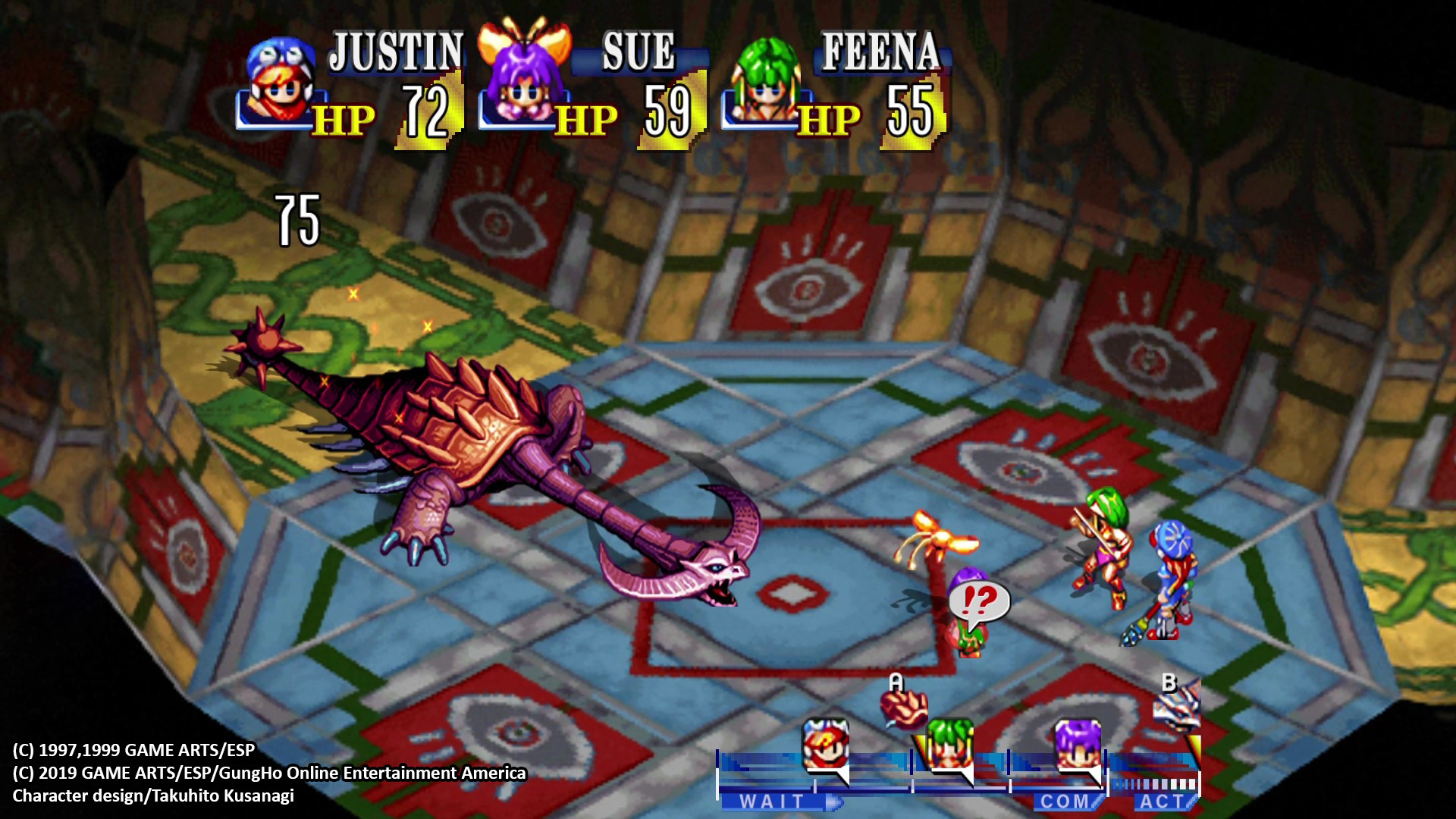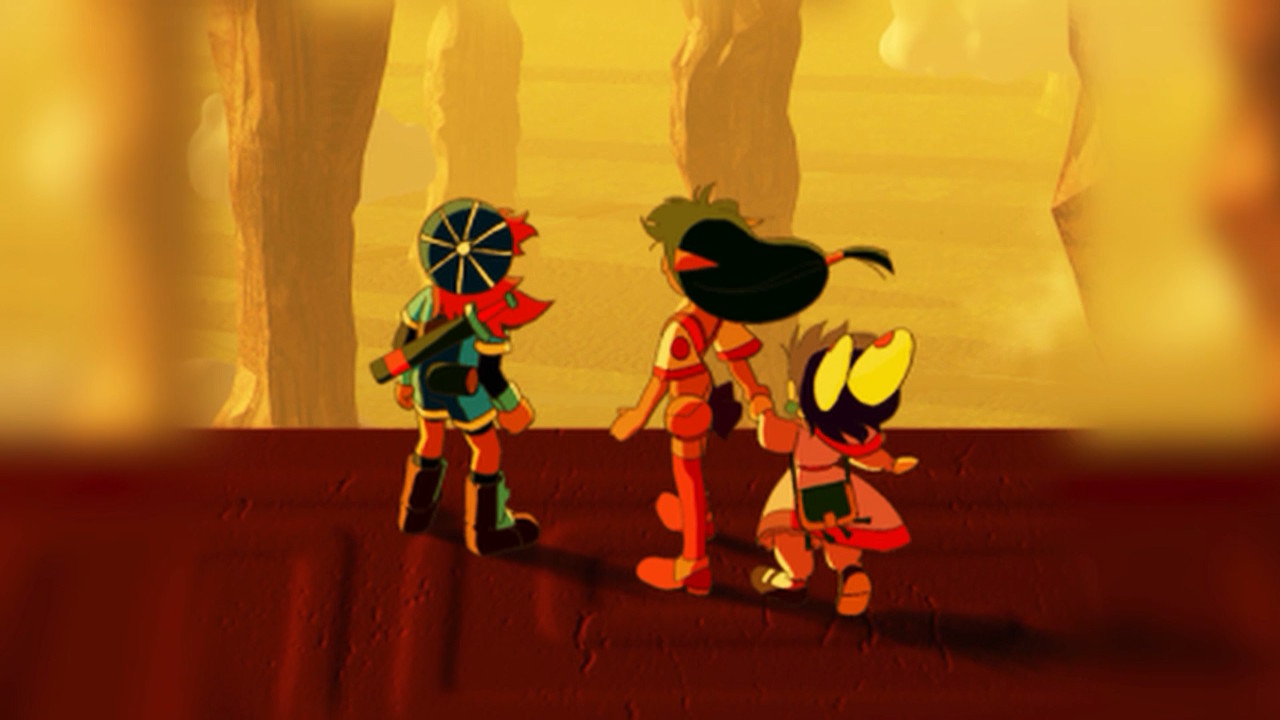
Note: Spoilers for Grandia will follow!
With Grandia's Justin, I think Martin Freeman's Bilbo Baggins may have a strong rival in the I'M GOING ON AN ADVENTUUUREE category. Seriously, though, I considered Grandia's lighthearted but not entirely oblivious tone and earnest cast a breath of fresh air from many offerings that try to be epic or deliver a heavy impact and fall short. Not only is it extremely difficult to think of an RPG protagonist that matches Justin's enthusiasm, that enthusiasm feels like a real, organic trait that impacts Justin's decisions and behavior. And what's more, it's a trait that Justin has to bear the consequences of on several occasions. This, along with a supporting cast featuring a great deal of personality and motivation of their own even when they're not responding directly to Justin, produces a tale that causes more impact than many of those other grandiose titles even with much lower stakes.
Sue's departure hit me harder than the train impact hit Nana, Saki, and Mio when the brakes were disabled, and that's more than I can say for a lot of other games. It means more than I can say to see female characters like Sue and Feena with so much autonomy and spark, even if that factor is dulled a bit by Feena's passive role toward the endgame, a locker room sequence with the aforementioned lieutenants (?), and every similar-looking, enemy-infested forest I had to get through between those conversations and moments.
Since I last spent time in the world of Grandia, I'd forgotten what an investment it was. What begins as some kids playing at adventuring results in a journey of epic proportions that clocks in at 50+ hours. Was it worth it? Yes, but with some reservation. Some of that time feels very earned, especially with a smooth combat system and all the ways you can work on characters' individual skills. The only reason I would hesitate is the sheer proportion of game time I spent lost in/navigating the frustrating dungeons. I have no qualms being stuck in a game due to clever dungeon design or even annoying as hell puzzles, but being stuck simply because the area looks homogeneous and it's difficult to tell what direction you're going is not something I can completely look past. Luckily, I don't have to, because even with that flaw, I can appreciate Grandia as a solid PlayStation era RPG with a lot of heart and some character growth that feels genuine. Part of the appeal of adventures is that they change you, and I think this game handles that well.

I can't think of a game I've played where my impressions changed more from the first time I played it to the second than Grandia. When I was younger, I remember being generally disappointed by the first two thirds of the game. The tone felt strange to me. I felt like the story never got moving, and the combat system didn't do enough to grab me. In fairness, I was expecting something that blended all the best parts of Final Fantasy VII and the Lunar games. Grandia's opening hours provided neither of those things. Conversely, I enjoyed the final hours of the game, where the story comes together and the "save the world" narrative begins. It may have taken me months to get there, but I left with a generally positive impression.
Coming back to it now, almost 20 years later, my impressions couldn't be any more different. I found myself enraptured by the tone of the game almost from the outset. The rhythm of the game might be simple (go to a town, find out about a problem, solve it), but every new town and every new continent helps maintain a spirit of adventure and optimism, along with allowing us to spend more time with Grandia's delightful characters. Justin is a fantastic protagonist who oozes charm and makes you not only believe that other people would follow him, but he also makes you want to follow him as well. Interactions with the surprisingly tough Sue, the surprisingly kind-hearted Gadwin, and the always delightful Feena reflect this spirit of positivity and the game is all the richer for it. Even most of the villains shine in the early going — Mullen is a charming leader who clearly respects Justin and his crew, Leen's arc is realistic and affecting, and even the other underlings have enough personality to make it all the more interesting. And yes, the combat is every bit as fresh as it was years ago, allowing for a surprising amount of depth and strategy in a system that seems relatively simple on the surface. It's a true highlight of the genre, and even if I didn't enjoy the other elements of the game, combat alone would make this game worthy of a revisit.
This time, though, the final hours didn't work nearly as well. All the goodwill the game put into building a charming world goes out the window as the narrative takes a hard turn toward despair. The plot becomes overly convoluted, and many of the core traits of the characters get tossed out the window in favor of the complex plot machinations. Don't even get me started on the dungeon design. Maybe I just don't remember my frustrations with it 20 years ago, but now the labyrinthine dungeons made my head hurt. Add to that an incredibly high enemy encounter rate, and the experience in the dungeons (despite the excellent combat system) is maddening.
Nonetheless, I am incredibly happy I came back to Grandia. I may like it for different reasons than I once did, but it's still an excellent, top-tier PSX era RPG. The romance, the optimism, and the delightful combat will keep me coming back again. We'll see if maybe I find some new things to like about it next time.



